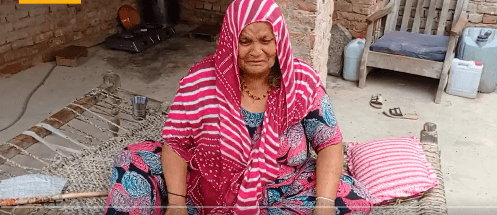A mournful silence now fills the once bustling, vibrant home of the Meghwar family, located on Matli’s Sessions’ Court Road in Sindh’s Badin district. The walls that once echoed with the innocent laughter of 15-year-old Shaneela Meghwar now stand as cold witnesses to her family’s anguish and desperation. Since June 23, when Shaneela was forcibly abducted at gunpoint from her home, the Meghwar family has been living a nightmare — one that continues to torment their every waking moment.
Shaneela, a bright student in class 9, had dreams as ordinary as any girl her age — dreams of a future shaped by education and hope. But those dreams were shattered that fateful night when two armed men stormed into her home. According to her uncle, Majnu Maharaj, the intruders pointed their guns at the family, violently pulled Shaneela out of her house, and threw her into a waiting white vehicle. The car, carrying two other men, disappeared into the night, leaving behind only shattered hearts and a community in shock.
Since then, not a word has been heard from Shaneela. Her family does not know where she is or even if she is still alive. The helplessness in her grandmother Demaan Maharaj’s voice is heart-wrenching as she weeps silently, unable to fathom the fate of her granddaughter. “It’s been days, and we don’t know anything — nothing,” Demaan says, her voice breaking with emotion. “Is she alive? Or has something terrible happened to her?”
In their darkest hours, the Meghwar family turned to the Matli police, but the response they received has only deepened their despair. Despite the gravity of the crime, the police seemed indifferent. Majnu recalls how the FIR (First Information Report) was only registered after community pressure, and yet it failed to name the main accused, Maqsood Dars. The family believes that the police are intentionally shielding the culprits, leaving them to wonder whether the justice system has failed them entirely.
For Shaneela’s family, the fear of what may have happened to her is compounded by a grim reality that many minority girls in rural Sindh face — the possibility of being forcibly converted and married, a tragic fate that continues to plague marginalized communities. The Sindh Child Marriage Restraint Act prohibits marriage under the age of 18, and forced religious conversion is legally condemned. However, in the remote areas where minority communities are politically and socially marginalized, the implementation of these laws remains dismal. This vulnerability is compounded by the power structures that protect perpetrators, making it nearly impossible for families like Shaneela’s to find justice.
Social media platforms have been flooded with posts about Shaneela’s abduction, calling for justice and highlighting the slow-moving investigation. Allegations have emerged, suggesting that powerful local figures may be shielding the abductors, further complicating the pursuit of justice.
Amid the silence of their grief, the Sindh Human Rights Commission (SHRC) has taken notice of the case, requesting police reports and vowing to monitor the situation. While this may seem like a step in the right direction, human rights activists remain skeptical about the impact such interventions will have in a system where justice is often elusive for marginalized communities.
The Meghwar family remains in limbo, trapped in a state of perpetual anxiety. Every day without Shaneela is a day filled with unbearable worry, yet their hope remains: “We just want her back,” Majnu pleads, his voice filled with a father’s anguish. “She’s a child. This should not be happening to any girl, any family — anywhere.”
As of July 17, there has been no breakthrough in the case. Shaneela Meghwar is still missing, and her family’s cries for justice grow louder with each passing day. But for now, all they can do is wait, pray, and hope for the safe return of their daughter — a hope that seems to be slipping further away with each passing hour.
In Pakistan, where minority communities often live on the margins of society, the abduction of a young girl like Shaneela is not just a personal tragedy; it is a stark reminder of the systemic injustices faced by those who are already invisible in the eyes of the state. It is a silent scream for help, a cry that has yet to be heard.
